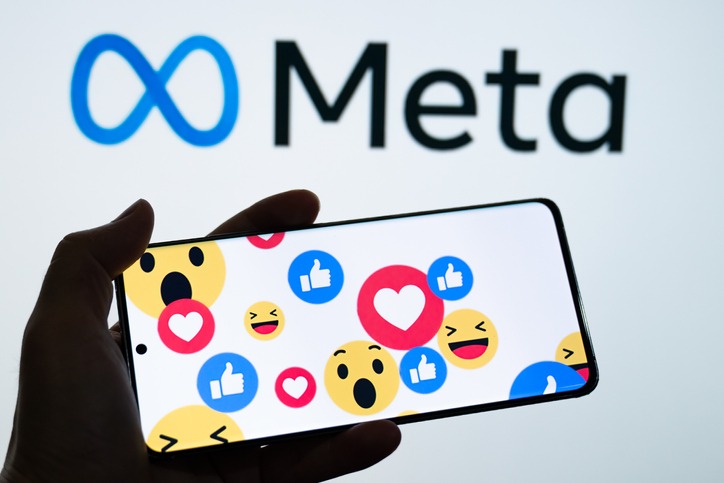The Scoop: Meta offers lackluster excuse after Reels goes haywire
Also: Bezos takes control over WaPo editorial viewpoints; Paramount tries to show commitment to DEI after canceling program.

Meta issued an apology on Thursday after some Instagram users reported being shown violent and graphic content on their Reels feed.
Users turned to other social channels to express concerns about disturbing content appearing despite having the highest moderation setting enabled.
On Wednesday night, CNBC reported that its staff members viewed several IG reels that appeared to show dead bodies, graphic injuries and violent assaults. The posts had “Sensitive Content” labels, per the report.
“We have fixed an error that caused some users to see content in their Instagram Reels feed that should not have been recommended. We apologize for the mistake,” Meta told CNBC.
How the incident happened isn’t exactly clear. Meta allows some graphic content to raise awareness about issues like human rights abuses and terrorism, often with warning labels, but it stresses that those are exceptions to its content policy. The technology company uses AI and a team of over 15,000 reviewers to detect disturbing content, prioritizing the removal of most violations before users report them.
Meta’s statement doesn’t provide any indication of what went wrong, only saying it had “fixed” something.
Why it matters: Any worthwhile apology must include a couple simple elements beyond a heartfelt “I’m sorry.” It needs a reason why the incident happened and a reasonable promise that it won’t happen again.
Meta didn’t do that. Not doing so was a missed opportunity to take accountability seriously and show a commitment to providing a safe, trustworthy experience.
Doing so is especially important for Meta right now given all the changes it’s making related to content moderation in the name of free expression.
That included shifting its automated systems from scanning for “all policy violations” to a focus on “illegal and high-severity violations, like terrorism, child sexual exploitation, drugs, fraud and scams,” CNBC reported. It also did away with its independent third-party fact-checkers in favor of a new “Community Notes” model. It also has laid off employees recently, including 20 on Friday for revealing confidential information.
In light of these changes, Meta needed to answer how they’d affect content decisions and address concerns about its ability to manage content effectively.
It didn’t do that, though. And now IG users are left wondering what’s taking place inside Meta’s algorithm.
Editor’s Top Reads
- Jeff Bezos plans to use the opinion section of The Washington Post to support viewpoints about “personal liberties” and “free markets.” The outlet will cover other topics as well, Bezos wrote on X, “but viewpoints opposing those pillars will be left to be published by others.” The move signals a more hands-on approach by Bezos in shaping the paper’s editorial direction. Elon Musk applauded Bezos’ decision. The decision has already led to internal upheaval at WaPo, with Editorial page editor David Shipley resigning over the changes, and economics reporter Jeff Stein called it a “massive encroachment” into the opinion section. “(I)f Bezos tries interfering with the news side I will be quitting immediately and letting you know,” Stein wrote on X. While news and opinion remain separate at the Washington Post, it doesn’t mean readers will see things that way. The publication reportedly lost 250,000 subscriptions following Bezos’ decision to rescind an editorial endorsement of Democratic nominee Kamala Harris weeks before the presidential election. Brands looking at earned media placements with WaPo should consider this editorial realignment when making their pitch, as it may influence the reception.
- Paramount is the latest brand to roll back DEI policies amid growing opposition to such initiatives. In a memo to employees, the co-CEOs announced the company will end aspirational hiring goals based on race, gender, and ethnicity, stop collecting diversity data for many U.S. job applicants, and remove DEI from employee incentives. “With our business objectives firmly in mind, we will continue to evaluate our programs and approach to ensure that we are widening our aperture to attract talent from all geographies, backgrounds and perspectives,” the memo reads. “That may mean expanding existing programs while ending others.” It also includes phrases like having a “workforce that reflects the perspectives and experiences of our many different audiences” and states that “Values like inclusivity and collaboration are a part of the Paramount culture and will continue to be.” Brands are in a tough spot. On one hand, they face pressure to roll back DEI policies. On the other, they want to highlight a commitment to diversity, even though it’s no longer a formalized priority. Paramount’s statement highlights its commitment, but without specifics, it feels hollow. Remember that classic writing mantra: show, don’t tell.
- The Consumer Financial Protection Bureau just dropped multiple lawsuits against financial institutions, marking a shift in consumer protections. One of the biggest cases accused Capital One of using deceptive tactics that cost customers $2 billion in interest. Others targeted mortgage lenders, student loan servicers and financial firms accused of shady practices, according to the New York Times. Acting Director Russell Vought has wasted no time scaling back the agency, putting staff on leave, canceling contracts and planning massive layoffs. “The weaponization of ‘consumer protection’ must end,” Russell posted on X announcing the dismissal of a case against SoLo Funds, making it clear this is just the beginning. For brands, these changes and court dismissals may lead to increased skepticism among consumers toward banks, lenders and businesses in general. With the current state of the world, it’s more important than ever to prioritize messaging around transparency and building meaningful relationships with consumers. In a time when many consumers feel vulnerable, brands that proactively earn and demonstrate trust will distinguish themselves and create long-lasting loyalty.
Casey Weldon is a reporter for PR Daily. Follow him on LinkedIn.







